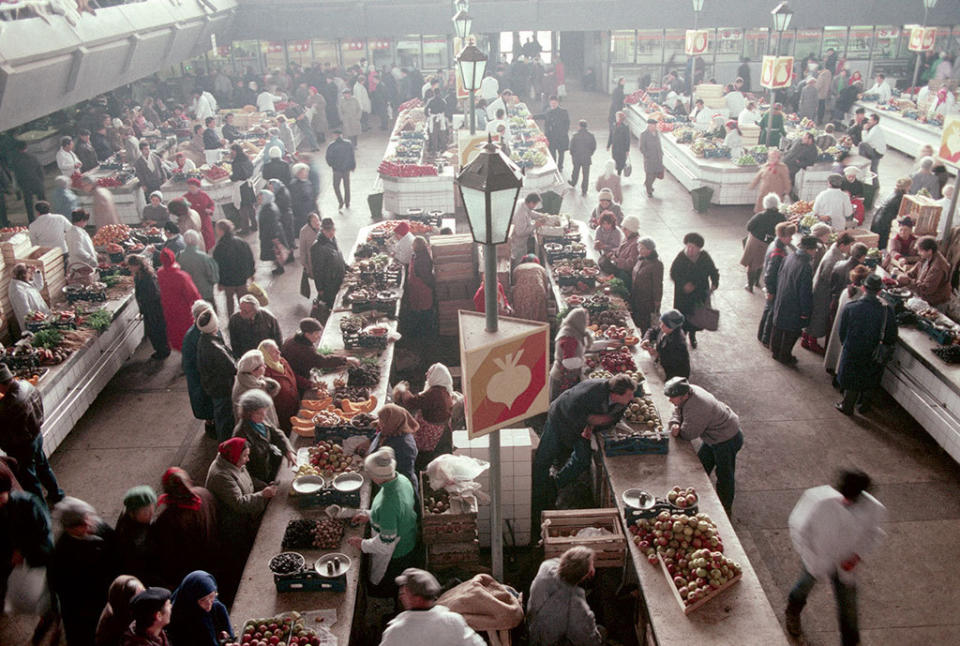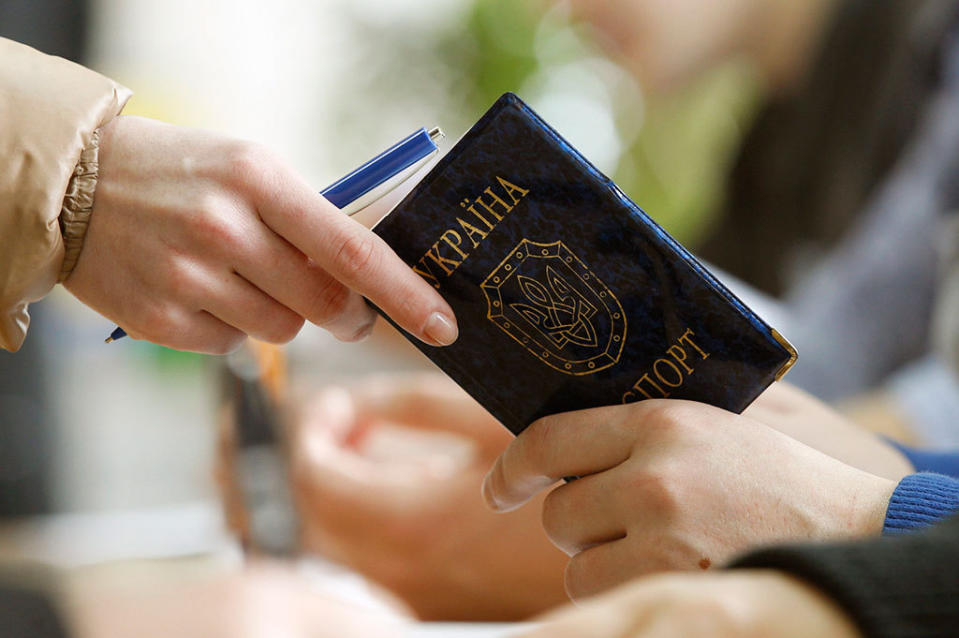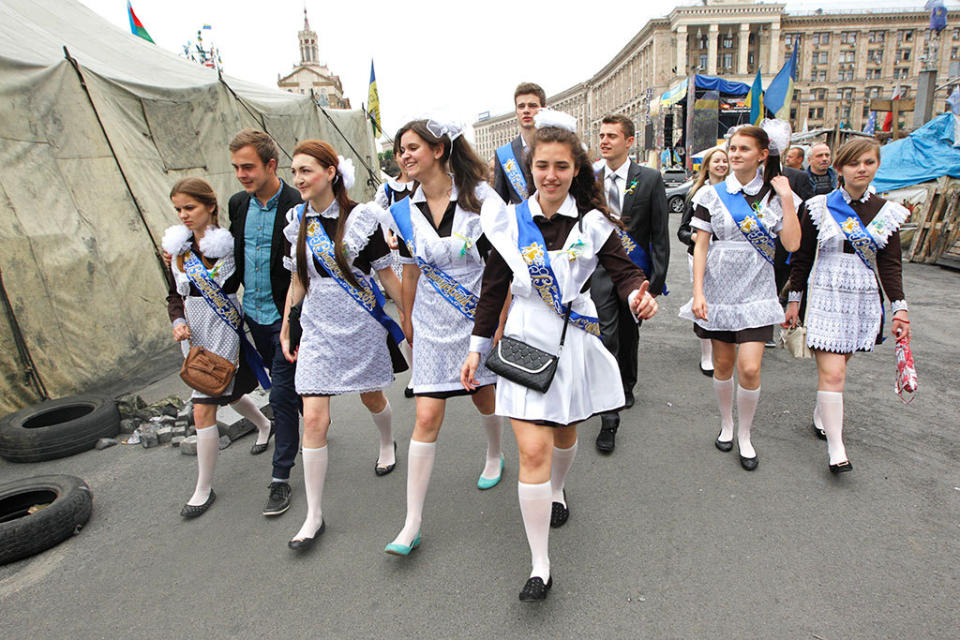‘My Daughter Is There and I Am Here. And We Are Like Strangers.’

In a cold and damp basement apartment in a New York suburb, Galina sifted through photographs from her home in Ukraine, looking at the life she left behind. Here was the house that she had built, a two-story villa with a balcony overlooking an orchard filled with blooming cherry trees and leafy grapevines. Here was her elderly mother, her wrinkled face framed by a kerchief, leaning on a cane. Here was her daughter Olga at her high school prom, dressed in a shiny blue gown, surrounded by a group of girlfriends, grinning broadly for the camera.
The last time Galina (whose name, along with Olga’s, has been changed to protect her anonymity) hugged her daughter, Olga was still a timid 13-year-old who liked her mother to help her with school homework and read to her before bed. Since then, a whole life has passed.
With no jobs and even fewer prospects in her small impoverished village in post-Soviet Ukraine, Galina had come to America to scrub toilets, tend to elderly people, nurse little children, and often sleep just five hours a day — all to give Olga a better future. She made the ultimate sacrifice a mother could make, a sacrifice that still torments her today, every day: Galina gave her daughter a comfortable and secure life, but a life without her mother.
Ever since she overstayed her tourist visa many years ago and became an undocumented immigrant, flying back to Ukraine to see her daughter even for a day became an impossibility, because she would not be allowed back into the U.S. So she clenched her teeth and kept working for her daughter’s sake, seeing Olga’s face in photos, listening to her voice over long-distance phone calls, and recently talking to her over Skype. Meanwhile, Olga turned into an attractive young woman, attended college, found a job, fell in love. It has been 10 years.
Galina, now in her mid-40s, is one of the estimated 11 million undocumented immigrants living in the United States who work menial jobs for meager pay to support their families around the globe, from Mexico to the Philippines to Ukraine. Many are unable to see their loved ones for years on end because even a short trip home for the sake of one long, tearful embrace would bar them from returning to the U.S. and condemn the whole family to poverty.
Now more than ever — when Ukraine is ravaged by war with Russian-backed separatists in the east of the country, and the national economy is barely afloat — Galina believes she cannot go back. She has decided that she will stay in New York and keep supporting her daughter and mother back home indefinitely.
But none of that matters now, because soon, very soon, she will see Olga, her little girl, grown into a young woman — a college graduate, a successful manager, a bride-to-be. Galina has saved enough money to bring Olga to New York on a short trip. Soon she will see her. Soon, she hopes, she will hug her.

Galina is a lean brunette with glasses, a round face, shoulder-length hair she tends to wear pulled into a ponytail, and a penchant for talking quickly and energetically in a high-pitched voice. She spoke with Yahoo Parenting in her home in a quiet suburb of New York, where she rents a basement apartment in a small house. The place is cold and moist, and in the winter Galina often wears a sweater and boots at home. The doorway is so low that even a short person has to stoop to enter.
As she told her story, pop songs and jokes on a Ukrainian radio station blared through the speakers of Galina’s black desktop computer that sat on a desk covered with dust. A photo of her daughter wearing a white shirt with a black bow stood in a shelving unit, along with religious statues and icons, small perfume samples, and a digestive-tract medication brought from the former Soviet Union.
Galina spoke in “surzhik,” a mixture of Ukrainian and Russian that is common in Ukraine. Her English is very limited, but she often interspersed her speech with English words, such as “no,” “experience,” and “shower,” the result of many years in America.
She explained how her road to America started with the quintessential American dream: the dream of building a house.

A Ukraine market. (Photo: Corbis Images)
Galina was born into a peasant family in a small village near the Carpathian Mountains in western Ukraine, where chickens and cows roamed dusty streets, and the statue of the great Ukrainian poet Taras Shevchenko towered over the main street. She trained to be an elementary school teacher and married young, at age 20, and had Olga a year later. Then Galina moved to her husband’s village far away from home, settling with his parents and working at the local school. This is where her idea of a journey away first began to take shape.
The in-laws’ house was old and cramped. Galina didn’t have a corner of her own, and she never felt quite at home. Her husband’s parents did not help her with her child or with household chores, leaving Galina to tend to six piglets and a cow in order to feed the family all on her own. Galina tried to make her peace with her new life, but eventually rebelled.
“I said to him, ‘I won’t live like this,’” she remembered telling her husband. “I want to have a home of my own. And I must do it.”
Galina’s husband did not oppose the idea, but was not particularly enthusiastic either, telling her that if she wanted to build a house, she would have to finance it herself. Ukraine’s post-Soviet economy was in shambles — hyperinflation turned the national currency into worthless pieces of paper, factories were closed down, and workers were laid off. Those who managed to hold onto their jobs did not see their salaries for months. Galina’s income as a teacher was minuscule, and her husband earned little working odd jobs. Galina decided to return to her home village and start her own business.
She began small, selling homemade cottage cheese and meat at the local market.
Soon, her business grew: She bought sunflower oil, butter, and sugar from other farmers and resold it at a profit. She then took her venture a step further, procuring children’s winter snowsuits, a must-have for the tough Ukrainian winters, and traveling to other regions of Ukraine to resell them there. Eventually, her dream came true. She earned enough to build a two-story brick house not far from her parents’ home with as many as 10 rooms, a balcony, and a large garden where she planted vegetables, fruit trees, and grapevines.
Galina was proud of her new house, but the work was far from finished. She wanted to lay warmer, more expensive floors, insulate the building from the winter cold, install new windows and doors, decorate it, buy new furniture. Then hard times hit. One year, Galina bought a large quantity of feeder grain, wheat, and barley that did not sell well. She didn’t make any profit, all her savings were eaten up, and her business went south.
Tired and dispirited, Galina decided to stay at home with her daughter and convinced her husband to look for work abroad since there were hardly any jobs around. Reluctantly, he found a job in Europe, first waiting tables and cutting up meat in a restaurant and then working in construction for several years.
This was a fortunate time for Galina — her husband, whom she did not have a happy relationship with, was finally supporting them, and she could focus on her daughter. She and Olga lived in their new house, doing homework and reading books together and turning the abundant produce and fruit growing in their garden into numerous glass jars of pickled tomatoes, cucumbers, salads, fruit juices, and compotes.
But one day, Galina received an angry phone call from her husband.
“He called me and said, ‘I won’t work anymore.’” He returned to Ukraine and soon disappeared from her life. “So,” she said, “I packed my bags and went to America.”

In the winter of 2004, Galina bid farewell to 13-year-old Olga and her mother, Anna, and set off for New York on a tourist visa. Leaving her daughter was not easy, of course, but she promised the crying girl she would only be gone for two years. There are no jobs, no salaries, no opportunities in sight, she told her. If she doesn’t go, how will the whole family survive, how will they finish their beautiful house?

A Ukrainian passport. (Photo: Corbis Images)
“It was very hard because I was leaving my child. It was so difficult,” Galina recalled. “But I told my mom, ‘I will finish the house, we will live here, we will have a good life, we will have everything, we won’t need anything.’ That is how I left for America.” She left her daughter behind for several practical reasons — first and foremost because she was going to the U.S. to work, and bringing a 13-year-old along would have made it more difficult in terms of housing, school, healthcare, and childcare. But also, if she had applied for a tourist visa for the both of them, the chances of them being turned down would have been higher, because the consular officer at the U.S. Embassy would’ve had more reasons to suspect that they were attempting to leave for good (and not as “tourists”).
In New York, Galina settled with acquaintances from Ukraine and began working as a babysitter for Russian-speaking families, taking care of someone else’s children while her own daughter was thousands of miles away.
Eventually, she was able to rent a place of her own and, living modestly, was sending her mother and daughter about $300 a month.
“I would send them money so that they would eat well,” Galina remembered. “I was cutting corners myself, but they were well taken care of. They didn’t live in luxury, but they had a decent life.”
Galina’s heart ached. She called home three or four times a week, spending more than she could afford on international calling cards, wishing she could take Olga to school, walk with her in the park, do her homework with her.
When two years passed, the choice she had to make was heartbreaking, but the decision itself came easy. Her husband had disappeared from their life and was not supporting Olga. Galina was the family’s only breadwinner, and there were no jobs at home. She had to stay in America.
“I have devoted my work to my daughter, to my mom,” Galina said.
As years went by, she switched to working as a home attendant for elderly people for $15 an hour and cleaning houses in New York and its suburbs, the hardest work of all, she said, for about $80 to $100 per job.
“You need to make it perfect,” Galina said with determination. “You must clean every corner, every section, here and there and there, and the spider web, and there, and there. It’s hard work.”
But this is what Galina likes most about America — the chance to earn her bread with honest work, even if it involves mopping floors and cleaning the pungent bedsores of bedridden patients.
“People don’t have salaries to pay for gas, for electricity, but they want to eat, they want to buy a piece of butter and also some meat. So instead of digging in the trash, you go abroad and you find work, honest work. You don’t steal, you don’t hurt anyone, you just do your work honestly,” Galina said. “America is a good country, I have no bad words to say about it.”
Besides work, Galina’s life has revolved around the tight-knit Ukrainian community in New York, with trips to Orthodox churches and occasional picnics and social gatherings in Brighton Beach, Brooklyn.
Inside, she has always longed for Olga. “My daughter is there and I am here. And we are like strangers,” she said.
Barring an amnesty or a comprehensive immigration reform, Galina’s chances of acquiring legal status in the United States are faint, Irina Matiychenko, an immigration lawyer at New York Legal Assistance Group, a nonprofit that provides free legal counsel to immigrants and other vulnerable New Yorkers, told Yahoo Parenting. One option would be to marry a U.S. citizen. But Galina is not dating anyone and has no plans to marry after her first marriage ended in divorce. And if she travels to her daughter in Ukraine, she will never be able to return.
“Formally, she will be banned from entering the United States for 10 years, but in reality she will never be able to get a visa and come here,” said Matiychenko. “I can only feel sorry for her.”

When she thinks about her mother, Olga told Yahoo Parenting via Skype, she remembers living in their big new house and doing homework together. Galina would wake her up early in the morning before school and drill her in German until Olga was ready to speak the language in her sleep. Olga also remembers that her mother read her books before bed, but she cannot remember which ones. It has been too long.

High school graduates in Ukraine. (Photo: Valentyn Ogirenko/Reuters)
When Galina was leaving for America — for what she promised was just a few years — Olga was too little to protest. When those two years turned into many, she would cry and assail her grandmother with questions that the old woman could not answer: “Why didn’t she take me? Why did she leave me with you?” Although she felt lonely and depressed, Olga never confided in her girlfriends and kept all her feelings to herself.
“I didn’t have any other choice. I just had to come to terms with this and tried to stay positive, to hold myself together,” Olga said. “It was hard. I missed her, of course.”
Olga spoke from an apartment in the western Ukrainian city where she lives and works, not far from her home village. Now 25, she grew up to be an attractive young woman with shoulder-length brown hair parted sideways, with Galina’s round face and her lively manner of speaking. While she talked, a white rabbit, Olga’s pet, could be seen jumping in the room in the background.
“It was very hard for me, I wanted to be together with you, but that was impossible,” Olga said in a trembling voice, as if addressing her mother. “I wanted to look at you, to be near you.”
In 2010, the International Organization for Migration estimated that there were some 200,000 children like Olga in Ukraine, one or both of whose parents live and work abroad for long stretches of time (according to a 2010 tally). In one region in Ukraine, one quarter of school children have one parent working abroad, according to an estimate cited in a 2010 report by IOM.
Overall, some 1.2 million Ukrainians, or 4 percent of the working-age population, were said to be working abroad in the years 2010–2012, mostly in European Union countries such as Poland, Italy, and the Czech Republic, and in Russia. Men usually work in construction, while women are employed in the domestic sector as nannies, cleaners, and caregivers. Like Galina, driven by the need to feed their families, migrants leave Ukraine in droves, find work abroad, some legally, others not, and send money back home, in what amounts to nearly 5 percent of Ukraine’s GDP. Galina says that there are dozens of people from her home village alone living in New York.
The absence of parents, especially mothers, takes a toll on children, sometimes referred to as social orphans in Ukraine. Many develop anxiety, aggression, and suffer from solitude.
“Of course, it’s hard for kids to be without their mom. Of course, they want to lean on her, to hug her, simply talk to her in the evening,” said Maryana Nych, a psychologist with Zaporuka (Linchpin), an Italian-funded NGO in Ukraine that helps families of labor migrants and has installed computers in remote rural schools so that children can Skype with their parents. “When this is lacking,” she told Yahoo Parenting, “of course it’s not good.”
But Nych and other experts warn against condemning labor migration as having an entirely negative effect on the migrants’ children’s lives. The money sent by a mother from Italy may allow her child to hire tutors, excel in school, attend university, and then get a decent job. It can also give children a chance to travel, broaden their horizons, and be exposed to the culture of the country where their parents work.
“Yes, they pay an emotional price for that,” Viktoriya Volodko, a sociologist who studies labor migration, told Yahoo Parenting. “But many children received a chance to get education, to travel, to see the world, build a good career, a decent career. And they themselves are no longer going to Italy to clean toilets there. They were able to receive a profession, an education, and get a decent job in Ukraine.”
Galina would like to hope that this is the case for Olga, who studied economics at a local college and now works as a manager at a government agency. Unfortunately, the collapse of the national currency in the economic crisis has reduced her salary to some $100 a month, and Galina still feels the need to help her.
“She came to terms with it. She got used to being with my mom,” Galina said of Olga. “She is working, everything is OK. She doesn’t drink or smoke, she speaks to me over Skype.”
Back in her apartment, Galina showed off some photos from Olga’s high school graduation ceremony, where, in line with local tradition, she is dressed in an oversized first grader’s uniform — a white apron over a dark dress, a pair of white knee socks and two big white bows in her hair. Another photo shows her wearing a glittery low-neck blue prom dress, with blue gloves going up to her elbows, her hair pinned up in an elaborate hairdo.
“This is her. This is her walking. See, she is dressed well,” Galina said proudly. “Everything is fine. You cannot even tell that she grew up without me.”
But Olga has a different view. She remembers how, during graduation, her classmates were surrounded by their parents and other relatives, while Olga only had her elderly grandmother by her side. “I was hurting,” she recalled. “I missed her.”
For years Olga was too young to travel to the U.S. Then Galina had her daughter’s university tuition to pay, and she also sent money home to finish building the house. But after Olga graduated college, Galina was able to start setting some money aside. Working even harder than usual, Galina saved enough for Olga to travel to New York for several weeks and arranged time off so that she could spend time with her daughter. After 10 years apart from Olga, she would finally see her.
In the summer of 2014, Olga took an overnight train to Kiev, the Ukrainian capital, which was still reeling from the Maidan revolution, three months of round-the-clock demonstrations in the center of Kiev that toppled the pro-Russian government after more than a hundred protesters were killed. That was Olga’s first time in the capital, but she was too nervous to do any sightseeing and spent all her time getting ready for her visa interview.
Olga showed up at the U.S. Embassy wearing one of her finest blazers over a white blouse and a skirt and clutching a file with documents. She waited nervously in line, studying other applicants, leafing through her papers. The consular officer, a man, looked at her file and asked her a few questions, then handed the documents back. In order to get a U.S. visitor visa, applicants must convince the consulate that they do not plan to stay in the United States and will return to their home country after the trip. Olga’s visa was denied.
“I just want to talk to her, to get to know her better. I haven’t seen mom for so many years,” Olga said, recalling the visa denial, wiping tears from her eyes. “I haven’t been with her, haven’t taken a walk with her or anything. Basically, I don’t know her.”

Since she left, Galina’s dream of a house has stood empty, waiting for its owner to return home. Olga lived with her grandmother in their old home and then moved to a nearby city to study and then work. Renting out the house was not an option in Galina’s poor village, and instead she sent money to renovate and decorate it together with floor plans and sketches.
“I designed this myself. I drew all of this myself from America,” Galina explained, displaying photos of the house. “This is my bedroom on the first floor.”
The house has multiple bedrooms, some painted pink and yellow, two living rooms, a dining room, a kitchen lined with tiles, a staircase, a basement, a white balcony on the second floor overlooking Galina’s grapevines, and a garden that would make any farmer jealous. “I have apples, cherries, sour cherries, raspberries. I have it all.”
With Ukraine reeling from war and a battered economy, Galina has decided to continue working in the U.S. as long as there is work, at least for now. When she does eventually return home, if she does, Galina plans to have barbecues in the shade of her fruit trees and make raspberry jam in her spacious kitchen. But she knows that she will no longer be able to watch Olga grow in this house. Olga may soon have children of her own.
In November, Olga married a young man she had been dating for a while. The wedding ceremony in a Ukrainian Orthodox church was attended by a hundred relatives and friends, but Galina watched it from her home over Skype, a glass of sparkling wine in her hand. She said the bride and groom’s first wedding dance, which they had rehearsed with a dance instructor, was so beautiful that many guests cried. Yet Galina was not there.
Was it worth the sacrifice?
Nych, the psychologist who works with the children of Ukrainian migrants, does not have a clear answer.
“There are unforeseen consequences in our lives, various difficult situations which force us to take certain steps, such as going abroad.”
But Galina’s answer is no.
“I say this to everybody, to all parents — children must grow up with their parents and parents must not do what I did,” Galina said. “I see this mistake, but I cannot undo it. But looking at my example, it’s parents who should raise their children, not grandfathers, not grandmothers. They must feel a mother’s tenderness, love.”
When Olga has children of her own, she hopes to give them a different life.
“When I have a family, a child, in the future, I will of course try to do everything I can to save the family and not to abandon my child,” she said. “Because it’s very hard. I know this feeling, it was very hard for me.”
Top illustration: Erik Mace for Yahoo Parenting
Please follow @YahooParenting on Facebook, Twitter, Instagram, and Pinterest. Have an interesting story to share about your family? Email us at YParenting (at) Yahoo.com.

